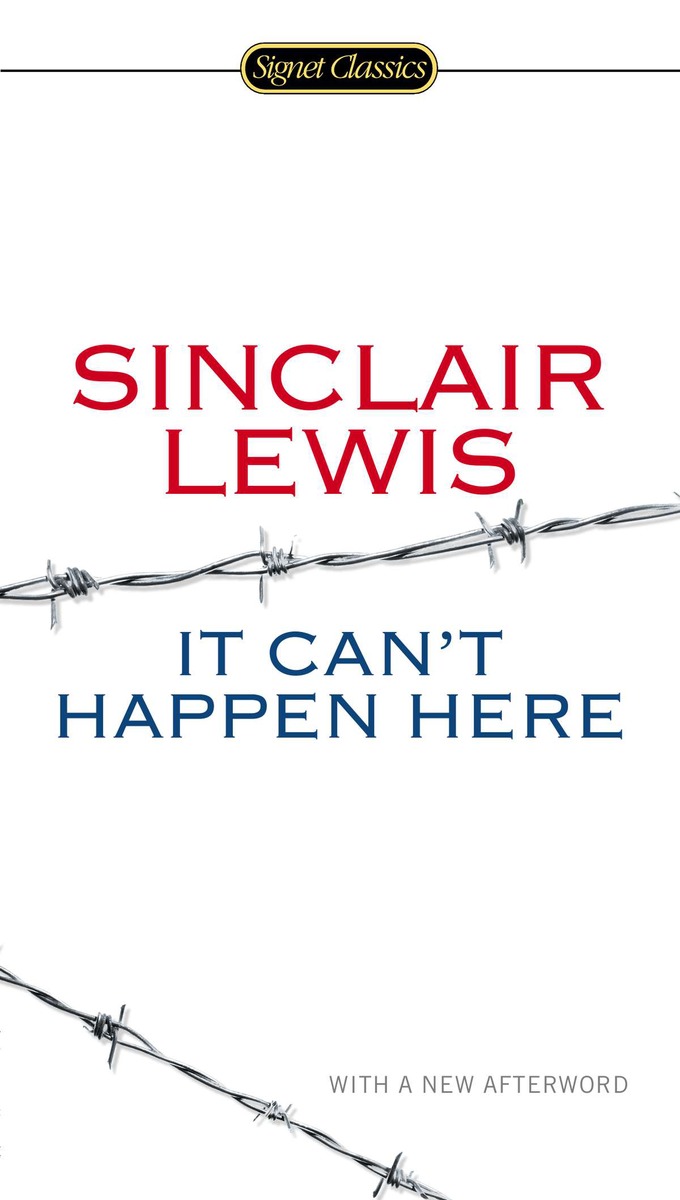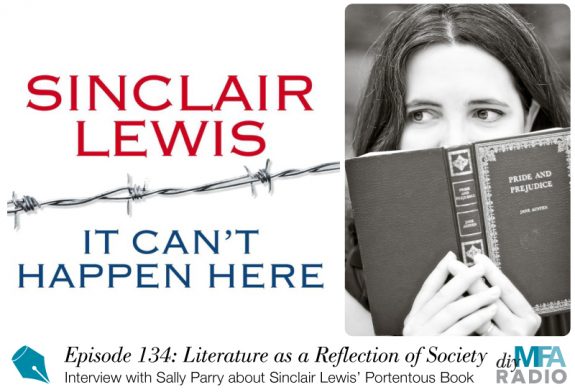Hello word nerds!
Today I have the pleasure of speaking with Dr. Sally Parry, the Executive Director of the Sinclair Lewis Society. She earned her PhD in American Literature (as well as 19th Century British Fiction and Medieval Literature) from Fordham University in NYC and wrote her dissertation on Sinclair Lewis (Sinclair Lewis: The Darkening Vision of His Later Novels). She is currently the Associate Dean for Academic Programs and Student Affairs at Illinois State University.
In this interview, we’re going to talk about Sinclair Lewis’ novel It Can’t Happen Here. Originally published in 1935 as a response to the rise of Hitler and Mussolini in Europe, It Can’t Happen Here has renewed relevance in the wake of Donald Trump’s campaign and election.
In fact, sales numbers for this title have gone through the roof, with mass market sales up 2,611% over last year, and eBook sales have jumped 1,528%. Not only that, this book has gotten a lot of buzz in the media in the past year, and this momentum doesn’t appear to be slowing down.
I’m excited to speak with Dr. Sally Parry about this book and the role that literature plays in politics and activism.
In this episode Sally and I discuss:
- Literature and activism
- Author intentions versus audience perceptions
- The social responsibilities of writers
Plus, her #1 tip for writers.
It Can’t Happen Here
 It Can’t Happen Here (affiliate link) is a cautionary tale about the fragility of democracy, and it is an alarming, eerily timeless look at how fascism could take hold in America. Written during the Great Depression, when the country was largely oblivious to Hitler’s aggression, it juxtaposes sharp political satire with the chillingly realistic rise of a president who becomes a dictator to save the nation from welfare cheats, sex, crime, and a liberal press.
It Can’t Happen Here (affiliate link) is a cautionary tale about the fragility of democracy, and it is an alarming, eerily timeless look at how fascism could take hold in America. Written during the Great Depression, when the country was largely oblivious to Hitler’s aggression, it juxtaposes sharp political satire with the chillingly realistic rise of a president who becomes a dictator to save the nation from welfare cheats, sex, crime, and a liberal press.
As with most books we feature on this site, the above is an Amazon affiliate link. This means if you choose to purchase via this link, DIY MFA will get a small commission at no cost to you. Thank you for supporting DIY MFA!
![]()
Recent media coverage:
- Salon.com, It really can happen here: The novel that foreshadowed Donald Trump’s authoritarian appeal (Sept. 2015)
- TIME, The Book People Are Saying Predicted Donald Trump’s Rise, as Reviewed in 1935 (Nov. 2016)
- The New Yorker, Getting Close to Fascism with Sinclair Lewis’s “It Can’t Happen Here” (Oct. 2016)
- Money, Sinclair Lewis Novel “It Can’t Happen Here” Sells Out Online (Nov. 2016)
- Salon.com, Books old and new in 2016 got boost from Trump candidacy (Dec. 2016)
- The Huffington Post, Books for Our Times: “It Can’t Happen Here,” by Sinclair Lewis (a Novel) (Nov. 2016)
- The Washington Post, How does Donald Trump stack up against American literature’s fictional dictators? Pretty well, actually. (June 2016)
- Houston Chronicle, The novel and play that predicted Donald Trump’s rise (April 2016)
About Sinclair Lewis
The Sinclair Lewis Society was formed to encourage study of, critical attention to, and general interest in the work, career, and legacy of Sinclair Lewis. The Society works to facilitate a broader discussion of his writing among scholars, critics, teachers, students, book collectors, and readers everywhere.
Members of the Sinclair Lewis Society receive the bi-annual Sinclair Lewis Society Newsletter. We encourage scholarship concerning Sinclair Lewis, and we have provided a bibliography of primary and secondary sources concerning Lewis on our scholarly works page, as well as transcripts from an exclusive interview with Richard Lingeman, author of Sinclair Lewis: Rebel from Main Street. We also meet every few years in Sauk Centre, Minnesota, Lewis’ hometown, for conferences and usually in connection with the annual Sinclair Lewis Days.
Harry Sinclair Lewis (1885–1951) was born in Sauk Centre, Minnesota. His childhood and early youth were spent in the Midwest, and later he attended Yale University, where he was editor of the literary magazine. After graduating in 1907, he worked as a reporter and in editorial positions at various newspapers, magazines, and publishing houses from the East Coast to California. He was able to give this work up after a few of his stories had appeared in magazines and his first novel, Our Mr. Wrenn (1914), had been published. Main Street (1920) was his first really successful novel, and his reputation was secured by the publication of Babbitt (1922). Lewis was awarded a Pulitzer Prize for Arrowsmith (1925) but refused to accept the honor, saying the prize was meant to go to a novel that celebrated the wholesomeness of American life, something his books did not do. He did accept, however, when in 1930 he became the first American writer to receive the Nobel Prize for Literature. During the last part of his life, he spent a great deal of time in Europe and continued to write both novels and plays. In 1950, after completing his last novel, World So Wide (1951), he intended to take an extended tour but became ill and was forced to settle in Rome, where he spent some months working on his poems before dying.
Link to Episode 134
(Right-click to download.)
If you liked this episode…
Head over to iTunes, leave a review, and subscribe so you’ll be first to know when new episodes are available. Also, if you know anyone who might enjoy this podcast, please share!
Until next week, keep writing and keep being awesome!








